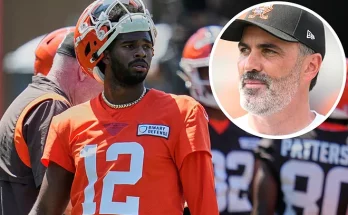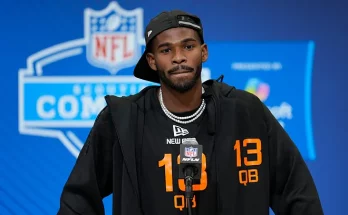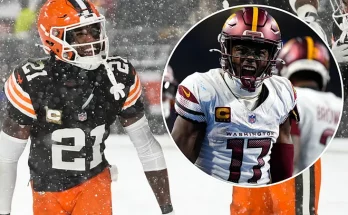LeBron James, one of the most influential athletes in the history of professional sports, is once again at the center of a major NBA controversy. This time, it isn’t about his performance on the court, a buzzer-beating three-pointer, or a championship chase. Instead, it revolves around a monumental $52.6 million player option for the 2025–26 season and the mounting pressure it places on the Los Angeles Lakers. The decision, while entirely within James’ rights, is fueling a wave of debate across the league. Critics argue that LeBron is leveraging his superstar status to force the Lakers’ hand—essentially demanding the franchise bend to his will or face the consequences of his potential exit. It’s a scenario that brings into question the delicate balance between player empowerment and organizational autonomy, and the conversation is heating up at every level of the basketball world.
LeBron’s impact on the Lakers can’t be overstated. Since arriving in Los Angeles, he’s not only delivered a championship in the 2020 season but also revitalized a dormant franchise that had spent years outside the playoff picture. His presence brought immediate national relevance, commercial success, and helped lure other stars to Hollywood. But with that influence comes leverage, and LeBron has historically known how to use it. This offseason, as he decides whether to opt into the final year of his deal worth $52.6 million or test free agency, the Lakers find themselves in an increasingly tight spot. The implication is clear: make significant roster improvements and demonstrate a commitment to contending for titles, or risk losing the cornerstone of your franchise and the marketing empire that comes with him.
Critics of James argue that this maneuver feels like deja vu. Throughout his career, he’s wielded similar influence in Cleveland and Miami, subtly nudging front offices into making roster changes that align with his championship window. Some moves worked. Others failed spectacularly. Now, at 40 years old and nearing the twilight of his career, LeBron seems to be applying the same pressure to a Lakers team that finished the 2024–25 season with clear deficiencies. The front office, led by Rob Pelinka, is under intense scrutiny to not only find another star to support James and Anthony Davis but also rebuild depth and improve the overall competitiveness of a team that has increasingly struggled to keep up with younger, deeper rosters in the Western Conference.
The concern from Lakers fans and basketball purists is not just about whether LeBron stays, but what it would take to convince him to stay. There’s a growing belief that this power dynamic gives James outsized control over a storied franchise known for its front office pedigree and championship heritage. For many, it feels like the franchise has to chase LeBron’s approval rather than build a long-term basketball vision. That dynamic can be problematic. When a team operates under the constant possibility of a star walking away, long-term planning becomes nearly impossible. Everything becomes reactive—win now, at all costs. The Lakers, once the gold standard for stability, find themselves in that very position, having to respond to LeBron’s timetable and preferences, even as his age makes the window for contention more narrow by the day.
What makes this situation even more complex is the presence of Bronny James in the 2025 NBA Draft. LeBron has publicly stated that he would love to play alongside his son before retiring, and it’s widely assumed that whichever team drafts Bronny could have a chance at signing LeBron as well. While some believe the Lakers should use their draft capital to ensure they land Bronny and keep LeBron happy, others argue that doing so would amount to compromising the team’s future for sentimental value. This added layer makes the $52.6 million decision feel even more significant—it’s not just about money; it’s about legacy, family, influence, and control.
There’s also the matter of how other players and agents perceive this dynamic. When LeBron holds a franchise hostage, even implicitly, it sends a message to the rest of the league about the culture within the organization. It could dissuade other stars from wanting to join the Lakers if they feel the team’s hierarchy revolves solely around one player. On the flip side, LeBron’s continued excellence—even in his 40s—still commands respect, and his pursuit of another ring could be enticing to players chasing titles and legacy. But that dynamic is fragile. It only works if the team is winning. If it’s not, the internal tensions can fracture a locker room and derail a season before it ever begins.
Despite the criticism, LeBron’s supporters argue that he’s simply using the tools that the collective bargaining agreement gives him. The player option exists for this very reason: to give players flexibility and power in a league where, for decades, management held all the cards. They point out that James is not doing anything unethical or unprecedented—he’s making a business decision, one that aligns with his personal goals and values. After all, if the Lakers were truly committed to winning at all costs, they wouldn’t need prodding from their star player to make improvements. The argument is that LeBron is merely holding the franchise accountable for its roster-building failures, particularly over the past two seasons.
The Lakers’ free agency strategy this summer will be telling. The team is expected to pursue another star-caliber player, and names like Donovan Mitchell, Dejounte Murray, and Trae Young have all been linked to potential trade scenarios. But these acquisitions would likely require giving up significant draft assets and current rotation players, which could leave the team top-heavy and vulnerable again. If the Lakers go all-in, it might appease LeBron in the short term but jeopardize the team’s future flexibility. If they don’t, it could lead to LeBron opting out and taking his talents—and his enormous commercial brand—elsewhere.
What’s also at stake here is the legacy of LeBron in L.A. While his championship run in 2020 was historic, some fans and pundits believe his Lakers tenure will ultimately be defined by how it ends. If he leaves amid turmoil and unmet expectations, it could cast a shadow over his time with the franchise. If he stays and makes another Finals run, it would further cement his place among the greats who wore purple and gold. For LeBron, legacy has always mattered—on the court, in the business world, and in shaping his broader impact on the sport. This decision, although financial on paper, feels like a domino that could impact all those areas at once.
From the Lakers’ perspective, there’s no easy answer. Caving to LeBron’s demands could mean mortgaging their future, but resisting him could result in the departure of the player who has been their identity for the past six years. The front office must walk a tightrope, trying to build a contender without completely surrendering control of the franchise to one player. That’s not to say LeBron doesn’t deserve input—his experience and IQ are unparalleled—but the question is how much is too much.
As June gives way to July and the player option deadline looms, the entire NBA world is watching closely. Will LeBron opt in and trust the Lakers to improve the roster? Will he opt out and explore free agency with teams that may draft Bronny or offer him a clearer path to a fifth ring? Or will the Lakers make bold moves in the next few weeks to reassure their superstar that they’re still all-in on building around him? Each potential outcome comes with its own set of consequences and ripple effects that could reshape the balance of power in the league.
What’s undeniable is that this situation—like so many others involving LeBron James—transcends basketball. It’s about influence, narrative, leverage, and the evolving role of athletes in shaping the organizations they represent. Whether you see LeBron as a mastermind controlling his destiny or as a demanding star stretching his influence too far, the conversation is impossible to ignore. One decision—$52.6 million on the line—may very well shape the future of the Lakers, the fate of Bronny, and the final chapter in one of the greatest basketball careers of all time.



